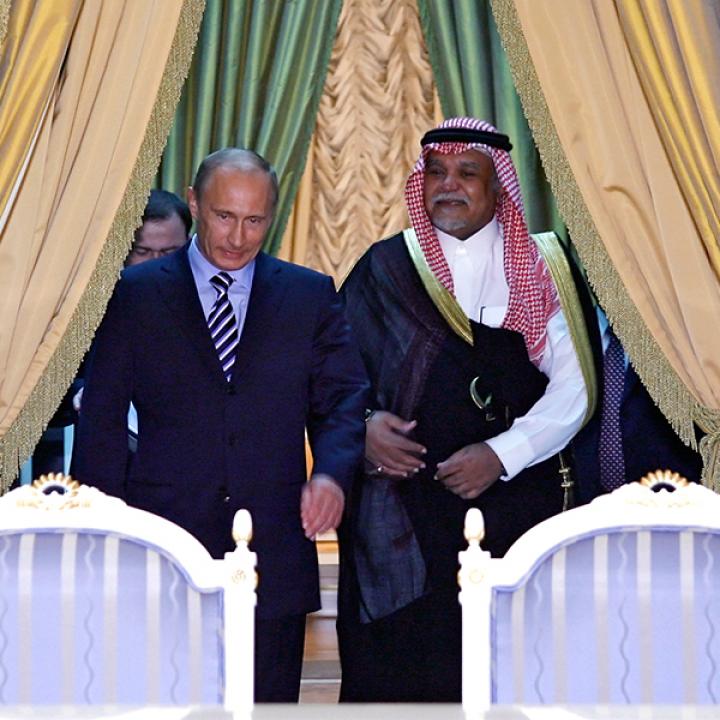

If Riyadh concludes a major arms deal with Moscow in return for reduced Russian backing of the Assad regime, it will come at the expense of U.S. influence in the Middle East and possibly across the world.
From the moment it was announced, the July 31 Moscow meeting between Russian president Vladimir Putin and Saudi intelligence chief Prince Bandar bin Sultan was clearly of political significance. The "long and serious" discussions between the two reportedly lasted four hours and left the Saudis "in a positive mood."
According to an August 7 Reuters report, Riyadh offered to buy $15 billion worth of weapons from Moscow and avoid threatening Russia's position as the main natural gas supplier to Europe, in return for Russia easing its strong support for the Assad regime and agreeing not to block any future UN Security Council resolution on Syria. According to unidentified diplomats quoted in the story, the Russian response has so far been inconclusive, though Moscow reportedly pressured Damascus to allow this week's visit by a UN mission investigating suspected chemical weapons use.
The Saudi diplomatic push shows Riyadh's determination to force the Assad regime's collapse, which the kingdom hopes will be a strategic defeat for Iran, its regional rival in both diplomatic and religious terms. It also reflects Riyadh's belief, shared by its Gulf Arab allies, that U.S. diplomacy on Syria lacks the necessary imagination, commitment, and energy to succeed.
Even in the absence of a response from Moscow, Prince Bandar's efforts appear to have made an impact at home. On August 6, Prince Salman bin Sultan, Bandar's younger half-brother, was appointed deputy defense minister. A key figure in Saudi arms transfers to Syrian rebels, Salman has served as deputy secretary-general on the Saudi National Security Council, a body that Bandar began running in 2005 after returning home from twenty-two years as Riyadh's ambassador in Washington. Pushed to one side was Fahd bin Abdullah bin Muhammad, a peripheral prince and onetime commander of the Saudi navy who had just been appointed deputy defense minister in April. Given the increasing dementia of Crown Prince Salman bin Abdulaziz -- the seventy-seven-year-old notional defense minister and heir apparent to King Abdullah (age 90) -- his new deputy defense minister (age 37) will effectively be in charge of the kingdom's huge and well-funded defense budget.
While the results of Saudi diplomatic efforts in Moscow await confirmation, back in the kingdom the message is that royal family politics have been enlivened by the elevation of Salman bin Sultan -- one of the sons of the late, long-serving defense minister Prince Sultan bin Abdulaziz -- to a crucial part of the kingdom's power structure. Salman may now be competing at roughly the same level as his cousins, Interior Minister Muhammad bin Nayef and National Guard Minister Mitab bin Abdullah, for the ultimate prize of the throne. (Bandar is ineligible because his mother was a slave.)
Meanwhile, the United States is apparently standing on the sidelines -- despite being Riyadh's close diplomatic partner for decades, principally in the hitherto successful policy of blocking Russia's influence in the Middle East. In 2008, Moscow agreed to sell tanks, attack helicopters, and other equipment to the kingdom, but the deal never went through. Instead, in 2010, Washington and Riyadh negotiated a huge $60 billion defense deal (including attack helicopters), the details of which are still being finalized. The events of the past week suggest that the U.S.-Saudi partnership -- which covers regional diplomacy, the Middle East peace process, the global economy, and weapons sales -- is, at best, being tested. It would be optimistic to believe that the Moscow meeting will significantly reduce Russian support for the Assad regime. But meanwhile Putin will have pried open a gap between Riyadh and Washington. The results of the latest U.S.-Russian spat will be watched closely, particularly in Saudi Arabia.
Simon Henderson is the Baker fellow and director of the Gulf and Energy Policy Program at The Washington Institute.



